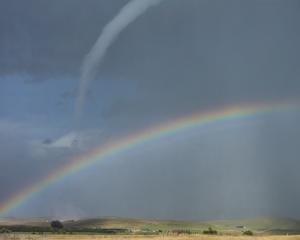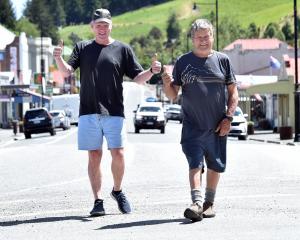Reporter Vaughan Elder talks to a few people in the know about the rise of a new generation of artists in Dunedin's thriving underground music scene.
The world's eyes are once again focusing on Dunedin's music scene as the city enters a golden era set to match the "Dunedin sound'' era of the 1980s and early '90s.
Two recent acts to attract international attention are Nadia Reid, whose album Listen to Formation, Look for the Signs attracted positive reviews following its international release and Kane Strang, whose debut album Blue Cheese was picked up by United States label Ba Da Bing Records.
Further evidence of Dunedin music's growing reach can be seen in the latest edition of United Kingdom music magazine Uncut, which features three acts from the city - Nadia Reid, The Chills and The Shifting Sands.
All three were given glowing reviews.
Ba Da Bing Records founder Ben Goldberg, of Brooklyn, who spoke with glee when discussing Dunedin music, said Strang was far from the only young Dunedin act to impress him.
He grew up with an almost "mythical'' view of New Zealand and particularly South Island music.
"New Zealand is a world away from my world and yet here is this music that I felt more of a connection to, a lot of the time, than a lot of music being made around me.''
And as a fan of Dunedin music he was "startled'' at the quality of the present crop of musicians when Ian Henderson, of Dunedin record label Fish Rider Records, sent him a copy of the compilation Temporary: Selections From Dunedin's Pop Underground 2011-2014, which his label ended up co-releasing.
"To suddenly be made aware of this whole new generation thanks to Ian, of all these musicians, none of whom I have ever heard of before, doing this great music, it was really exciting.''
The quality of the acts on the compilation and the city's musical past showed there was something special about Dunedin "and the kind of people who live there'', which made it a "wellspring for musical creativity''.
There was "without a doubt'' a resurgence of the Dunedin music scene.
Of the artists on the compilation, Strang's song Winded stood out, which was crucial to him getting signed.
"It circled and dived and went all over the place, but it all kept together.''
He believed Strang had what it took to be a success in the United States.
"I do not think he's the next Lorde.
"But, if you are talking about as popular as [fellow New Zealand band] Unknown Mortal Orchestra, then yes absolutely.''
Fishrider Records founder Ian Henderson said Strang's upcoming United States release was a continuation of a renewed recognition of Dunedin music worldwide.
"Since 2010, to me, it's been as good as the '80s was.''
He believed there were strong bands in the intervening period, but the music scene had more of a "profile'' now than it did in the late '90s or early 2000s.
"People from outside Dunedin tend to look at the '80s and maybe the first half of the '90s as being a golden era and then now.''
Henderson started his record label in 2006 with the release of an album by a friend's band The Dark Beaks followed by releases of music by his brother's band The Puddle.
It was only in 2011 or 2012 when he started releasing albums by younger bands, starting with Opposite Sex.
"I was a bit frustrated that I was going and seeing fantastic bands but there was nobody releasing them and nobody outside of Dunedin really knew what was happening.''
He did not want to take too much credit for the resurgence of the music scene, saying his label had just been a "conduit''.
He believed alternative music was an important part of the city's identity and an "intangible'' asset when it came to marketing Dunedin as a place to live and visit.
He had met postgraduate students who had come to study at the University of Otago because of the city's musical history, without which "they probably wouldn't have even known Dunedin existed.''
Many of the recent Fish Rider releases were available overseas through United Kingdom label Occultation Recordings, including albums by Opposite Sex (2012), Trick Mammoth (2014), Death And The Maiden (2015) and The Shifting Sands (2015).
Albums by Males and Trick Mammoth were also licensed for release by a label in Japan in 2014.
Hope Robertson, who plays guitar for Bad Sav and Death and the Maiden, agreed the scene was strong at present.
"I don't think there is more bands, I just think there are a few that are quite good.''
More bands were being invited to play in Auckland and Wellington, which gave Dunedin artists the opportunity to learn from bands in other parts of the country.
Dunedin was a good place to make music.
"I think you kind of get left to your own devices a little bit.''
Keyboardist for The Prophet Hens Penelope Esplin said there were always great bands coming out of Dunedin.
"I don't feel like there are more good bands than usual, but I do think that there are comparatively more opportunities for bands than there were 10 years ago.
"In most instances, bands come and go quickly - people move town for various reasons or members simply move on to different projects.''
She reckoned the quality of Dunedin music could be to do with the cheaper cost of living in the city, there being fewer distractions than larger cities and the fact it was easy to get around.
Dunedin musicians and the wider community were supportive and embraced unusual forms of art.
"You really almost never hear a bad word said about what people are creating, which is a beautiful thing.''
Her band had just finished recording its second album.
"We think it's a step up from our previous release and can't wait to show it off in half a year or so.''
Males bass player and Otago Daily Times music writer Sam Valentine (23) said now was definitely was a "golden period'' for Dunedin music but it had always been good.
"Maybe people are just paying more attention now.''
There was not a lot of money in it for Dunedin musicians and almost all of them had other jobs.
"I don't know anyone my age who is supporting themselves off music.''
Having his band's music played on college radio in the United States was "cool'' but he was inspired when he went to the US and saw his record in a small record store.
"One person in New York is walking around with a copy of this record, which is a much more tangible thing to grab on to.''
Why alternative music thrives in Dunedin
• It's a relatively affordable city to live in - meaning young bands can survive on very little and spend more time making music.
• There are enough people in the city - with the University of Otago and the Dunedin School of Art - who embrace alternative music.
• Most of the time there have been supportive live music venues that have encouraged bands which play "weird and original music''.












